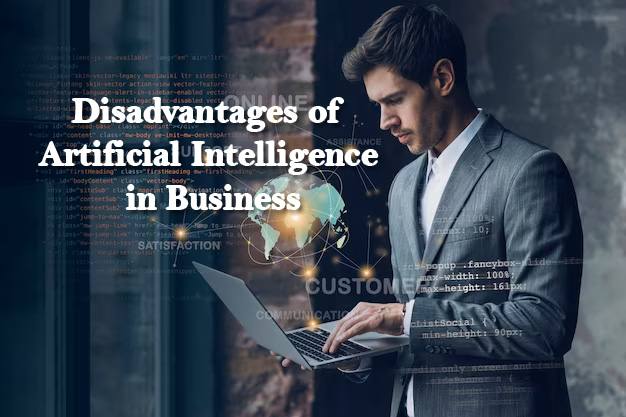Disadvantages of Artificial Intelligence in Business: In Recent years, the integration of Artificial Intelligence (AI) into business operations has surged, promising increased efficiency, productivity, and innovation. While the advantages of AI in business are undeniable, it is crucial to scrutinize the potential drawbacks that accompany this technological revolution. This article delves into the disadvantages of AI in business, highlighting the challenges that organizations may face as they navigate the complexities of automation.
Images Source: FreePic.Com
Also See: Future of Ai In Manufacturing: Thing to Know
6 Disadvantages of Artificial Intelligence in Business
Job Displacement and Workforce Transformation
One of the most significant concerns surrounding the adoption of AI in business is the potential for job displacement. As automation and machine learning algorithms take over routine and repetitive tasks, certain jobs may become obsolete. This can result in unemployment and a need for the workforce to adapt to new skill sets. The rapid pace of technological change can make it challenging for employees to keep up, leading to a growing divide between those with relevant skills and those left behind.
Moreover, the fear of job loss can create a sense of job insecurity among employees, impacting morale and overall workplace satisfaction. To mitigate these challenges, businesses must invest in training programs and upskilling initiatives to ensure their workforce remains adaptable in the face of evolving technological landscapes.
Ethical Concerns and Bias in Decision-Making
When historical data used to train AI models contain biases, those biases can be perpetuated and amplified, leading to discriminatory outcomes. In business, this can result in biased decision-making processes, affecting areas such as hiring, promotions, and customer interactions.
Also See: Future of Artificial Intelligence in Marketing: How
Ethical concerns also arise in the context of privacy, as AI systems often require access to vast amounts of data. Businesses must grapple with the responsibility of handling sensitive information ethically and transparently, ensuring that customer privacy is protected and that data is used responsibly.
Cost of Implementation and Maintenance
While AI promises long-term cost savings through increased efficiency, the initial costs of implementation can be substantial. Developing and deploying AI systems require significant financial investments in both technology and talent. Small and medium-sized enterprises (SMEs) may find it particularly challenging to allocate resources for AI adoption, putting them at a competitive disadvantage compared to larger enterprises.
Additionally, the ongoing costs of maintaining and updating AI systems should not be underestimated. Technological advancements and evolving business needs may necessitate frequent updates, which can strain a company’s budget over time. Businesses must carefully weigh the potential benefits against the upfront and ongoing costs associated with AI adoption.
Also See: Features of Artificial Intelligence
Lack of Understanding and Trust
The complexity of AI systems often leads to a lack of understanding among employees and stakeholders. In many cases, decision-makers may not fully comprehend how AI algorithms arrive at specific conclusions or recommendations. This lack of transparency can erode trust in AI systems, making it difficult for businesses to fully integrate these technologies into their decision-making processes.
Building trust in AI requires transparency, explainability, and education. Businesses must invest in initiatives to educate employees and stakeholders about how AI works, its limitations, and its potential benefits. Establishing clear communication channels regarding AI implementation can foster a culture of trust and collaboration within the organization.
Security Risks and Vulnerabilities
The integration of AI into business processes introduces new security challenges. AI systems rely heavily on data, and any compromise of that data can have severe consequences. Cybersecurity threats such as data breaches, hacking attempts, and malicious use of AI pose significant risks to businesses.
Also See: Disadvantages of AI in Cybersecurity No
Furthermore, AI systems themselves can be vulnerable to adversarial attacks, where malicious actors manipulate input data to deceive the system. Businesses must invest in robust cybersecurity measures to safeguard AI infrastructure and data, ensuring the integrity and confidentiality of sensitive information.
Dependency on Technology
While AI can enhance efficiency and decision-making, overreliance on technology can be a double-edged sword. Businesses may become excessively dependent on AI systems, leading to a reduction in human oversight and critical thinking. In scenarios where AI systems fail or make erroneous decisions, the consequences can be severe and may include financial losses, damaged reputation, and regulatory repercussions.
To mitigate the risks of overdependence, businesses should implement contingency plans and ensure that humans remain in control of critical decision-making processes. Maintaining a balance between human judgment and AI capabilities is essential to navigate the uncertainties associated with technology.
Also See: 20 Disadvantages of AI in Education:
Regulatory Compliance and Legal Challenges
Businesses implementing AI must navigate a complex landscape of laws and regulations governing data privacy, security, and ethical AI use. Failure to comply with these regulations can result in legal challenges, fines, and damage to a company’s reputation.
Navigating the regulatory landscape requires a proactive approach, with businesses staying abreast of evolving laws and standards. Legal departments must collaborate with technology teams to ensure that AI implementations align with existing and emerging regulatory requirements, reducing the risk of legal complications.
Conclusion
While the advantages of AI in business are undeniable, it is essential to acknowledge and address the potential disadvantages to ensure responsible and sustainable integration. By understanding and mitigating challenges such as job displacement, ethical concerns, implementation costs, trust issues, security risks, technology dependency, and regulatory compliance, businesses can harness the power of AI while minimizing its negative impacts.
Also See: Different AI Types Based on Functionality
Striking the right balance between human intelligence and artificial intelligence is key to building a future where technology enhances rather than detracts from the overall well-being of businesses and society. As AI continues to evolve, businesses must remain vigilant, adaptive, and committed to ethical practices to navigate the complex landscape of AI in the business world.
